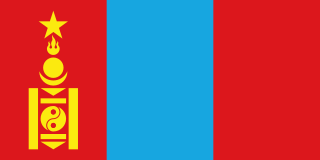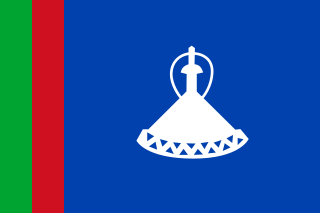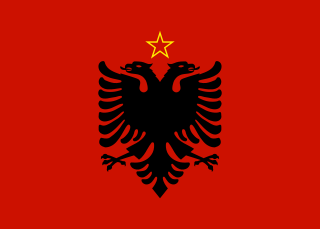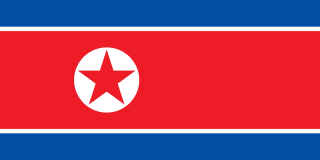
Shooting sports is a group of competitive and recreational sporting activities involving proficiency tests of accuracy, precision and speed in shooting — the art of using ranged weapons, mainly small arms and bows/crossbows.

Mongolia competed at the 1972 Summer Olympics in Munich, West Germany. 39 competitors, 37 men and 2 women, took part in 39 events in 7 sports.

Puerto Rico competed at the 1972 Summer Olympics in Munich, West Germany. 53 competitors, all men, took part in 37 events in 10 sports.

New Zealand competed at the 1972 Summer Olympics in Munich, West Germany. For the first time at the Olympics, God Defend New Zealand was played instead of God Save the King/Queen. The New Zealand Olympic Committee was represented by 89 competitors, 82 men and 7 women, who took part in 63 events in 14 sports.

The International Shooting Sport Federation, aka ISSF, is the governing body of Olympic shooting events. It also regulates several non-Olympic shooting sport events. The Federation's activities include regulation of the sport, managing Olympic qualification events and quota places, and organisation of tournaments like the World Cup and World Championships.

The ISSF World Shooting Championships are governed by the International Shooting Sport Federation. World Shooting Championships began in 1897, after the successful 1896 Summer Olympics, and although the ISSF was not founded until 1907, these early competitions are still seen by the organization as the beginning of a continuous row of championships. By this logic, the 2006 competition in Zagreb was called the 49th ISSF World Shooting Championships. These championships, including all ISSF shooting events, are held every four years since 1954. For the shotgun events only, there is an additional World Championship competition in odd-numbered years. These extra competitions are not numbered. In running target, there will be World Championships in Olympic years.

Lesotho sent a delegation to compete in the 1972 Summer Olympics in Munich, West Germany from 26 August to 11 September 1972. This was the African country's first time participating at the Olympic Games. Lesotho's delegation consisted of a single sprinter, Motsapi Moorosi. He competed in two events, being eliminated in the first round of the 100 meters, and advancing to the quarter-finals of the 200 meters.

Colombia competed at the 1972 Summer Olympics in Munich, West Germany. 59 competitors, 55 men and 4 women, took part in 39 events in 8 sports.

Venezuela competed at the 1972 Summer Olympics in Munich, West Germany. 23 competitors, 20 men and 3 women, took part in 27 events in 4 sports.

Peru competed at the 1972 Summer Olympics in Munich, West Germany. 20 competitors, 17 men and 3 women, took part in 25 events in 7 sports.

Albania competed at the Summer Olympic Games for the first time at the 1972 Summer Olympics in Munich, West Germany. Five competitors, four men and one woman, took part in three events in two sports.

Norway competed at the 1936 Summer Olympics in Berlin, Germany. 70 competitors, 68 men and 2 women, took part in 43 events in 12 sports.

Portugal competed at the 1972 Summer Olympics in Munich, West Germany. 29 competitors, all men, took part in 28 events in 8 sports.

North Korea competed as the Democratic People's Republic of Korea at the 1972 Summer Olympics in Munich, West Germany. It was the first time that the nation had competed at the Summer Olympic Games. 37 competitors, 23 men and 14 women, took part in 23 events in 10 sports. North Korea won the first Olympic gold medal from either Korea.
Guy Starik is an Israeli sport shooter who has competed in four Olympics. He has won gold medals in shooting at both the European Championships and at four World Cups, and shares the world record in the 50 meter rifle prone competition.

The mixed ISSF 50 meter pistol was a competition at the 1972 Summer Olympics. It was held on 27 August 1972 at Schießanlage in Munich. There were 59 competitors from 36 nations. Nations had been limited to two shooters each since the 1952 Games.

Shooting competitions at the 2020 Summer Olympics in Tokyo were originally scheduled from 25 July to 3 August 2020, due to the postponement of the Summer Olympics to 2021, the rescheduled dates were on 24 July to 2 August 2021 at the Asaka Shooting Range. Unlike in 2016, the number of shooters competing across fifteen events at these Games had been reduced from 390 to 360, with an equal distribution between men and women. Furthermore, several significant changes were instituted in the Olympic shooting program, including the substitution of three male-only events, with the mixed team competitions.
Henry Herscovici was an Israeli sports shooter. He competed at the 1968 Summer Olympics and the 1972 Summer Olympics. He also competed at the 1966, 1970, and 1974 Asian Games and the 1965 and 1969 Maccabiah Games.
Owen Napier Denbigh Phillips was a Belizean sports shooter. He competed at the 1972 Summer Olympics and the 1976 Summer Olympics. At the 1972 Olympics, he competed in mixed 50 metre free pistol and mixed 50 metre rifle, prone. At the 1976 Olympics, he competed in mixed 50 metre rifle, prone.
The 1st ISSF Rifle/Pistol World Shooting Championships were held in New Administrative Capital, Egypt from 12 to 27 October 2022 in 78 events. This also served as qualification event for 2024 Summer Olympics.















